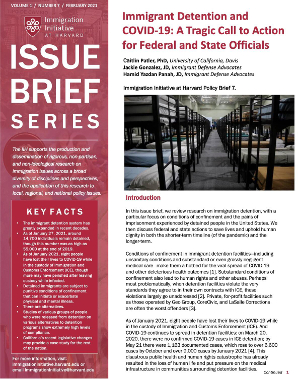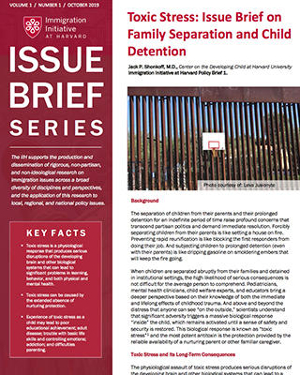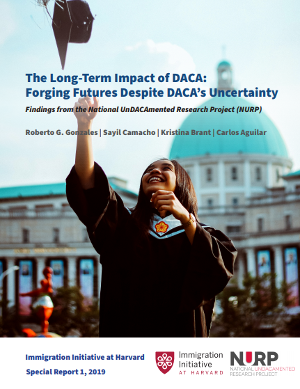
Addressing the Needs of Students Affected by Return Migration
By Maricruz Vargas Ramirez, Anakaren Quintero Davalos, & Alejandra Ramos GómezDownload PDF
Over the last decade, the phenomenon of return migration— individuals returning from their host to native country – has been on the rise. In this Ed Brief, we describe the new features of this phenomenon with a particular focus on the educational challenges for children and make recommendations for practice focusing on the U.S./Mexico context.
For media outreach about the brief, please contact:
immigrationinitiative@harvard.edu

Implementing Culturally Responsive Teaching Practices for Immigrant-Origin Students
By Corinne HébertDownload PDF
In this Educator Brief, we outline what research suggests are the promotive and protective functions of preserving heritage languages for children’s academic outcomes, cognitive development, and social-emotional well-being. We also consider how children’s use of and skills in the heritage language are vulnerable to loss. Lastly, we provide guidelines for steps educators and schools can take to work with families and communities to nurture children’s heritage language skills.
For media outreach about the brief, please contact: immigrationinitiative@harvard.edu
Why Heritage Language is Important for Immigrant Origin Children’s Development & Learning
By Gladys María Aguilar, Michael Ángel Vázquez and Isabel FitzpatrickDownload PDF
In this Immigration Initiative at Harvard Educator Brief, we outline what research suggests are the promotive and protective functions of preserving heritage languages for children’s academic outcomes, cognitive development, and social-emotional well-being. We also consider how children’s use of and skills in the heritage language are vulnerable to loss. Lastly, we provide guidelines for steps educators and schools can take to work with families and communities to nurture children’s heritage language skills.
For media outreach about the brief, please contact: immigrationinitiative@harvard.edu
Understanding & Supporting MENA & Muslim Students
By Shaza Jendi, Andrena Mason, Bisma Nasir, and Carola Suárez-OrozcoDownload PDF
Research shows that today, there are an estimated 3.85 million individuals of Middle Eastern and North African origins in the United States, 1.35 million of which are children. Muslim Americans are a diverse and growing population, currently estimated at 3.45 million people of all ages, including 2.15 million adults. In this Immigration Initiative at Harvard Educator Brief, we provide an overview of who MENA and Muslim families and students are, offering insight into their complexity and internal diversity. With a few key principles in mind, we make recommendations to help administrators, staff, and teachers adopt culturally responsive methods to support Muslim and MENA students.
For media outreach about the brief, please contact: immigrationinitiative@harvard.edu
Recognizing Immigrant-Origin Students in Higher Education
By Dr. Carola Suárez-OrozcoDownload PDF
Research indicates that immigrant-origin students are a growing and yet often unrecognized presence in higher education. While institutions of higher education have rightly become attentive to their “first-generation” and racial-ethnic minority students, they tend to overlook their fastest growing population of students—immigrant-origin students. What should we know about their complex identities and how to best serve them?
For media outreach about the brief, please contact: immigrationinitiative@harvard.edu
Supporting Black Immigrant Students and Their Families
By Edom TesfaDownload PDF
Research shows that since the 1990s, as the Black immigrant-origin population in the U.S. grows, programs aimed at immigrant students and families may not be inclusive.
For media outreach about the brief, please contact: immigrationinitiative@harvard.edu
Mentorship: Promoting Developmental Competencies, Resources, and Strengths in Immigrant Origin Adolescents
By Azure MaucheDownload PDF
Research suggests that both informal and formal mentoring relationships can promote positive developmental trajectories for immigrant origin adolescents across broad domains that include academic, cognitive, health, psychological and social outcomes.
For media outreach about the brief, please contact: immigrationinitiative@harvard.edu
School Climate & Immigrant Students
By Carola Suárez-Orozco & Kara MaddenDownload PDF
School climate is the collective experiences of students, educators, and families in a school context. It is made up of several important dimensions which include interpersonal relationships, physical and psychological safety, teaching and learning practices, the physical space conditions.

A Whole Child Approach: The Key to Immigrant Origin Student Thriving
By Carola Suárez-OrozcoDownload PDF
A whole child approach is child-centered and recognizes ALL domains of child development including academic, cognitive, physical, mental, social-emotional, and identity. A whole child approach recognizes that each of these domains of development are inter-related and that each need be addressed for children to thrive.
In the world of education, for immigrant origin (IO) students, identification, data, practice, and funding, have largely been focused on the domain of language learning. While English language acquisition is clearly linked to both cognitive and academic development, this narrow focus on English language development neglects all the other critical domains of whole child development. This constricted focus fails to recognize that language acquisition is deeply intertwined with many other domains of learning. Further, the language learning designation, neither accurately nor comprehensively captures the lived experiences that immigrant origin students bring with them to school.
For media outreach about the brief, please contact: immigrationinitiative@harvard.edu













